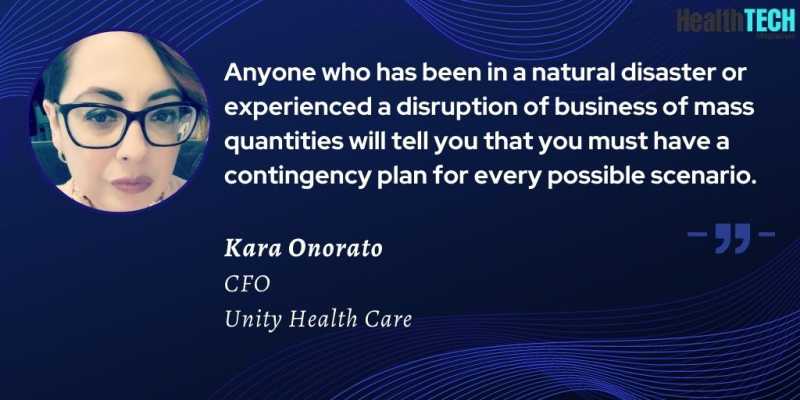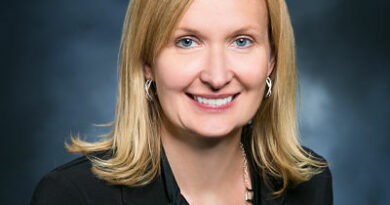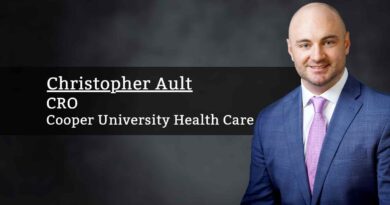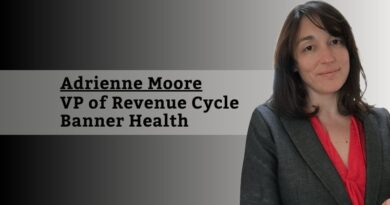Three Lessons That I Learned As A Child That Helped Me As A CFO During COVID
By Kara Onorato, CFO, Unity Health Care
Two years ago, I decided that my current position was no longer challenging enough. After working most of my 20 years of career in some governmental organization, I thought I would take the opportunity to grow my professional tool kit and accepted an offer to be the CFO of one of the largest Federally Qualified Health Centers (FQHC) in the country. Their mission of providing health care to some of the Nation’s Capital’s most vulnerable populations, regardless of their ability to pay, deeply resonated with me.
While I had served taxpayers in various capacities as a government CFO, this opportunity gave me the ability to help an entire part of the DC community that has similarities to my very own childhood. Like many of our patients, I have experienced homelessness, food scarcity, and had limited access to quality healthcare. Ironically it would be the very lessons that I learned during my childhood that helped me navigate the pandemic in a way that would ultimately help our organization survive.
1. Managing a Crisis
One thing that you learn to do when you are faced with the idea of not knowing where you are going to get your next meal from or what will happen if you cannot find shelter is how to manage a crisis. Managing a crisis requires you to be able to pivot without a moment’s notice. It teaches you that you must maintain calm and keep a level head in order to devise a plan that will work. According to John Gordon, a calm, positive leader who can express urgency in a way that does not cause the staff to panic is one that will have the best results from their team.
During the initial onset of the pandemic, our organization had barely established telehealth and teleworking was akin to a swear word. Anyone who has been in a natural disaster or experienced a disruption of business of mass quantities will tell you that you must have a contingency plan for every possible scenario. Unfortunately, we did not have a well-practiced disaster plan; much less have one that included a pandemic.
I immediately thought about what my parents did once we became homeless. They developed a set of rules that determined how they could preserve cash on hand. Right at the onset, our organization had enough to make two to three payrolls and maybe a little left to pay only the most essential vendors. Two weeks post orders to quarantine, our billable visits shrunk overall by 65% and in some of our clinics, it was by 100%.
Our billable visits equate to about 50% of our total revenues. That is not a hole that can just be plugged by initiating a hiring freeze and stopping all purchases except for items related to taking on COVID. As it was, as a non-profit, we were running a very tight ship with a profit margin that would make for-profits run. However, they do not have the same passion for the mission to care for those that most health care organizations would right off.
2. You Get More Bees With Honey
According to my initial projections, we would not be able to make payroll by mid-May if our billable visits stayed where they were. I knew that it was going to take more than my title of CFO and having a say as to what and who will get paid. The first part of my plan was to reach out to all our vendors and tell our story and ask for a payment deferral or discount. I shared with them that not only do 100,000 DC residents rely on us for medical care; they also depend on us for many secondary social services that they are linked to just by being our patient.
I looked back to my second-grade teacher and how she would always say that you can get more bees with honey. She was right. It wasn’t enough to just NOT pay our vendors. I wanted to be able to preserve our relationship with them, but still be able to benefit from holding onto cash longer. I made personal calls to sales reps, CFO’s, and owners. To my surprise, not only did they grant us deferrals, but they also donated meals to our front-line workers. They made monetary donations. They also donated thousand of units of PPE.
3. Find a Side Hustle
It seemed that my father was always trying to find new and additional ways to make money. He taught us that having one job or income stream was never enough to keep you financially secure. The same can be said of any organization; especially during a pandemic. While we were able to fully roll out tele-health within less than two weeks; we still lost about $3 million in revenues that we would never be able to recoup. Besides, one of our contracts that we have with the District Government was losing about $700,000 a month.
We knew that the lost billable visits would not impact our cash flow for another 60-90 days, but the contract revenue losses were an immediate impact on our cash flow. We had to think about how we were going to keep our billable visit number at pre-COVID levels and more. We also had to think of other ways that we could generate revenue.
Being the largest FQHC in the Nation’s Capital means we have a significant impact on medical care within the District. We wanted to be a partner in every way possible to help combat COVID. We wanted to make sure that we not only stayed in business but were able to meet the needs of the community. We were able to secure a contract with the local Department of Human Services. We were asked to provide medical care in a series of hotels that the District set up to be used for isolation and quarantine units for individuals experiencing homelessness, those who had COVID related symptoms, or just for those who had nowhere they could quarantine or isolate due to their living arrangements. I am convinced that without it, we would have had to talk about staff reductions.
Conclusion
While times may be uncertain and we are still feeling the financial impacts of COVID, we were able to come together not only to keep our organization operating but to make sure DC residents do not go without quality healthcare that is affordable and accessible. People often ask me why I am a CFO and why I work for Unity Health Care when it can be very demanding of my time. My response is twofold. One reason is that today’s CFO is more of a strategic partner than ever before; which is what I love. However, the biggest reason is that I get to provide and maintain resources that allow 100,000 individuals to receive care that could very well save their lives.



